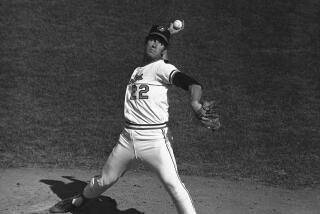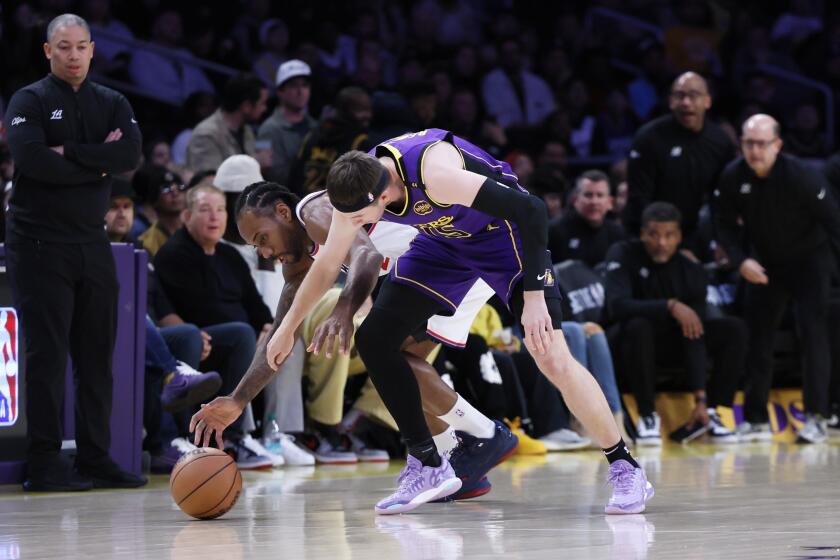Baltimore is No Longer Trapped by Ripken’s Streak
- Share via
Cal Ripken’s consecutive-games streak was a wondrous achievement that will outlive us all as a piece of sporting lore.
In time, no one will remember that its last months were marked by a shrill and sometimes ugly debate over whether it should end.
That and all controversies generated by the streak will be reduced to historical dust in the long run, overwhelmed by the accomplishment itself.
But the streak did need to end, regardless if history surrenders to that conclusion.
It needed to end because, well, with all due respect, it no longer served the Orioles’ best interest.
Not because Ripken, 38, was a debit on their ledger after playing in 2,632 straight games at shortstop and third base. To the contrary, he has played much better in the second half of the season than he did earlier.
And as for that tired (pun intended) speculation about him needing a day off, please, enough. There’s no evidence he’ll play better with a few days off, and there was never evidence that playing in so many games in a row hindered him. The impact of the streak on his play was never quantifiable and never will be.
Anyway, that’s not even the issue. What’s best for Ripken isn’t the priority anymore, not with the Orioles smoldering in the ashes of a $69 million bonfire.
The priority is what’s best for the Orioles, 15 years removed from their last World Series appearance.
And what’s best for the Orioles is to have Ripken freed from the self-imposed shackles of his remarkable streak. Why? Let us count the ways.
To begin with, it enables the manager to manage at every position. Imagine that.
Orioles Manager Ray Miller has defended Ripken’s constant presence as the least of his problems, and there’s some truth to that. Still, it’s unhealthy to have untouchables in a lineup. The manager can’t do his job. Clubhouse jealousies arise. It’s no way to build a cohesive team. The Orioles are Exhibit A.
As well, Ripken is going to finish 1998 with fewer home runs and RBIs than many of the American League’s regular third basemen. He is still more solid in the field than many at the position, and he has hit for a decent average, but his power and production are in decline. And at his age, he’s unlikely to reverse the decline.
In other words, he no longer really belongs in the lineup every day. The Orioles are giving up offensive ground to the rest of the league at his position. And the only way to make up some of that ground is to try a different approach. Mix in other players.
No, not that often. With the stability and consistency he provides, Ripken should still play in at least 120 games next season, regardless if he is back at third base or switched to first.
He still has a lot to offer. He can help. And that’s fine.
But the time has come to give others a shot, too. Ripken’s 162-game mandate has expired.
There are options now, that’s for sure. No longer can it be said that Ripken should play every day simply because the Orioles have no alternatives.
Willis Otanez is an alternative. He murdered the ball as Rochester’s third baseman this season. Miller called him “an offensive force.” The Orioles are foolish not to give him a shot in 1999, and they owe him one after pushing him into the outfield to keep Ripken’s streak intact and then watching him break his wrist.
Maybe Otanez is a major-leaguer, maybe not. But it’s time to find out.
Willie Greene is an alternative, too. Sure, he’s a defensive liability. But his speed and potent left-handed bat could come in handy on some nights.
B.J. Surhoff is another alternative, provided he re-signs. He played third a few years ago, remember. And let’s not forget Ryan Minor, still in the pipeline.
Then there are free agents such as Dean Palmer and Robin Ventura. Yes, Palmer would represent a major give-back in the field -- he has 22 errors this season, to Ripken’s eight--but with 112 RBIs this season (through Monday), he certainly could soften the loss of Rafael Palmeiro.
One way or another, it’s time for the Orioles to start tinkering with Ripken’s position instead of leaving it alone simply because it’s Ripken’s position.
They certainly need to find new ways to get better, as the games-behind column attests.
Ripken isn’t going to like it, there’s little doubt of that. Even though he ended the streak so gracefully Sunday night at Camden Yards, he still wants to play every day. His stubbornness is his greatest asset.
But it’s no insult to start experimenting with replacing a 38-year-old player, legend or not. It’s just reality. Common sense.
It’s the least any club should do with a position manned by a player nearing the end of his career. No offense intended.
That’s why the streak needed to end.
The Orioles were trapped by it, Ripken was trapped by it, Miller was trapped by it, and it was a potential hindrance to a disappointing team that’s going to experience another overhaul this winter.
Give Ripken credit for bowing to those pressures at last.
“It was time to change the subject,” he said.
Yes, it was.
More to Read
Go beyond the scoreboard
Get the latest on L.A.'s teams in the daily Sports Report newsletter.
You may occasionally receive promotional content from the Los Angeles Times.









